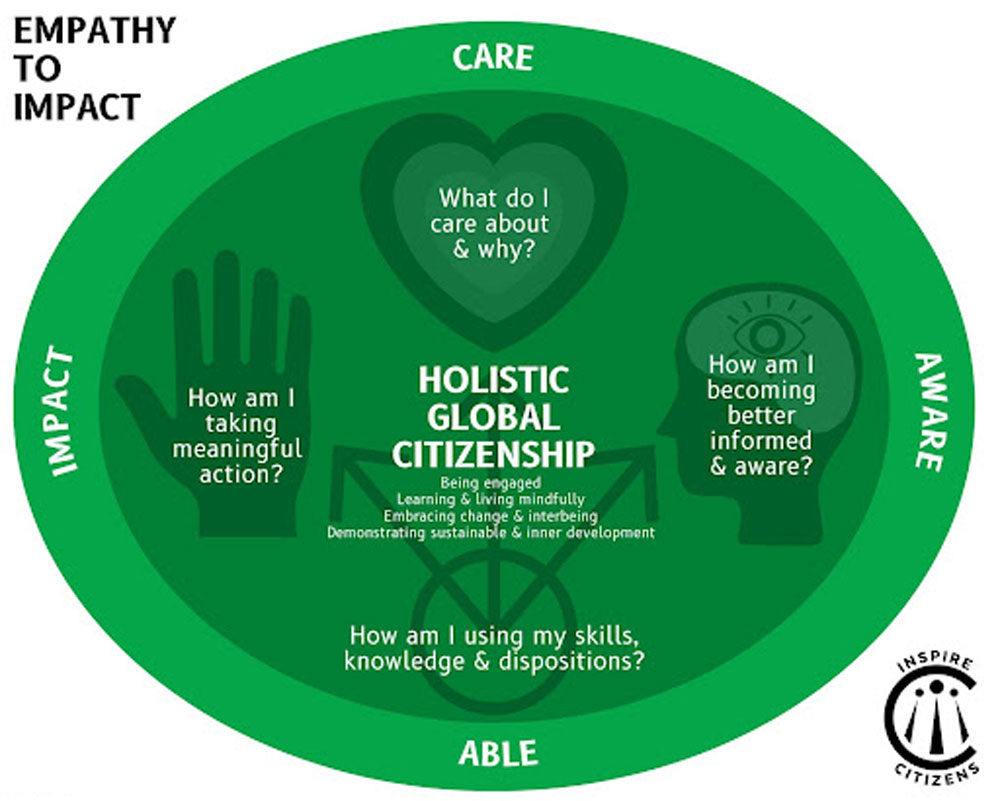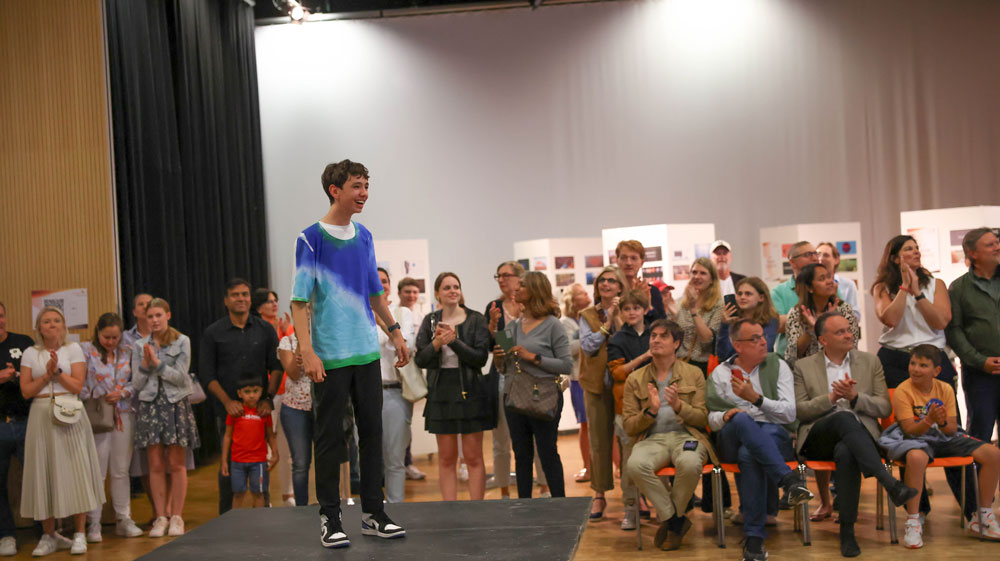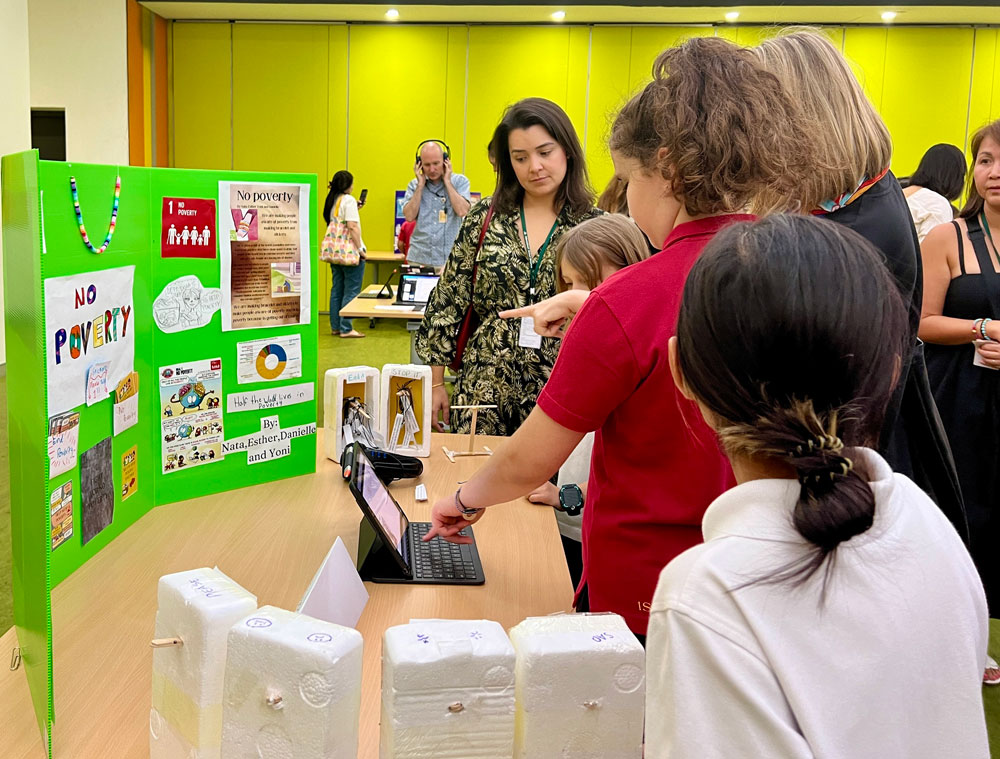
An Inventory of Five Ideas Already Growing In International School Communities
Student agency is the holy grail of engagement - a fact known all too well by educators who work extra hard to facilitate it. The planning for optimal outcomes happens at every scale from community-wide forums down to the student-facing level. However, a successful approach for one school context might be a giant flop in another, with variables such as social norms, socio-economic circumstances, and community partnership potential all playing influential roles. Divining the right approach is likely to come from solid research, advanced planning, professional development, and a willingness to plant the first seed. Gazing over the fence at what the (virtual) neighbors are successfully growing might get us thinking.
Many schools around the world are actively engaged in developing vibrant student agency programs. Through continuous collaboration, shared practices, and the exchange of ideas, these schools are nurturing environments where student agency thrives, leading to meaningful and impactful outcomes. Below are a meaningful handful of seeds that are currently growing into vibrant student agency outcomes.

Seed 1: From Empathy to Impact: Engaging Students in Real-World Issues
One powerful way to cultivate student agency is by guiding learners from a place of empathy to making a tangible impact on real-world issues. The "empathy to impact" model empowers students to connect deeply with global challenges and take meaningful action. Two international schools exemplify how this approach transforms learning experiences.
At the Inter-Community School of Zurich, head of design Daniel Bush and head of Theory of Knowledge and English literature teacher Jonathan Cotterill collaborated on an interdisciplinary unit (IDU) that captivates both students and teachers. Leveraging Aaron’s expertise, they developed a unit focusing on the pressing issue of fast fashion—the rapid production of inexpensive clothing often at the expense of environmental and labor standards.
As a culmination of the fast fashion IDU, students hosted an all-out fashion show in which each individual wore their self-designed item to the applause of their peers and parents. Family members could watch their children boldly sharing their self-designed garment while scanning a student-specific QR code from a large display to explore a body of work from the semester. (Photo source: Inter-Community School of Zurich)
Spanning 17 weeks, the IDU engaged students in analyzing their own fashion consumption patterns, researching social and economic interrelationships, and participating in creative fashion design opportunities which extend a wide range of choice in the creation of a fashion statement. The unit culminated in an intra-community fashion show where each student modeled a garment they design and craft. Daniel shared a poignant example, “One student was initially reluctant but ultimately became highly committed. His design required a lot of devotion. You could see the love that he put into every stitch.”
The project also incorporated a service component. Students organized a clothing swap event, collecting nearly new items from their wardrobes and offering them to the community. Proceeds support local charities through the school’s Round Square chapter. “We made a decision to really tie service-as-action into this IDU,” said Daniel. “Students also write reflections on the event and on the process.”
Meanwhile, at the American Embassy School in New Delhi, middle school social studies teacher Jenn Call employed the empathy to impact model to help her students understand migration issues. She designed a unit where students create fictional first-person narratives of migrants forced to move because of real-world push factors. Jenn’s students were fortunate to hear a firsthand account by an Afghan immigrant that deeply influenced the authenticity of their own narratives. “It was incredibly powerful and moving to hear about Sofia’s perseverance as her family navigates the asylum-seeking process in India,” Jenn said.
Jenn emphasized the importance of embracing the messy process of shifting perspectives. “It’s really about helping our kids develop a real understanding of ‘What does it mean to have freedom of movement? Who actually has freedom of movement? What is it that is restricting those who lack freedom of movement? And how can we understand what's happening in the world with true empathy?’” To share their work, students create projects ranging from artistic renderings to videos and e-books, which are then shared with the school community via QR codes. “Unit planning is always a work in progress,” she reflected, “and it's helpful to have those who understand that and who are willing to work beside you as you go through that process.”
Starting point: Survey the landscape of student life to see which global issues impact their lives and audit your existing curriculum to see natural entry points for agency, action, and transfer. Leverage these natural starting points for building genuine empathy.
Seed 2: Building Leadership Capacity in Students
Empowering students to take on leadership roles is a pivotal step toward enhancing student agency. When students assume leadership positions, they not only spearhead initiatives within their schools but also inspire their peers to engage more deeply with their learning experiences. A recent initiative by Inspire Citizens, in partnership with the Association of International Schools in Africa (AISA), exemplifies how building leadership capacity can create lasting impacts.
A three-part Student Leadership Series, co-facilitated by Inspire Citizens' co-founder Aaron Moniz and AISA service-learning program coordinator LeeAnne Lavender, engaged 115 students from schools across the AISA region. Designed to help students combine leadership with changemaking, the virtual series was met with enthusiasm and active participation.
“It was incredible to see so many students come together online to learn about how they can approach leadership with sustainability and changemaking in mind,” said Aaron. The sessions provided a platform for students to connect, reflect, and grow as future leaders committed to positive change.
LeeAnne was equally impressed by the students' engagement. “Each session resulted in emails and messages from students who were reflecting on their current and proposed leadership initiatives,” she noted. “One student wrote, at the end of the series, that she was so happy to connect with like-minded individuals, express herself, and build her communication skills. Those are specific and positive impacts!”
The series was thoughtfully structured to build leadership skills progressively:
Session 1: Students explored their "why"—what they care about and why they want to serve in leadership positions.
Session 2: Students learned to use four tools to assess current and future initiatives for sustainability and inclusion: root cause analysis, the Sustainability Compass, Strengths, Weaknesses, Opportunities, Threats (SWOT) analysis, and backmapping from desired futures.
Session 3: Students pitched their leadership and action ideas to peers, learned a feedback protocol called "stars and wishes,” and participated in breakout groups to discuss and ideate on leadership aspects.
The impact of the series extends beyond the sessions themselves. AISA has launched a new Student Design Team comprising 15 student leaders from international schools across Africa. These students will continue to foster student leadership initiatives through online and face-to-face events.
Initiatives like the Student Leadership Series not only equip students with essential leadership skills but also inspires them to apply these skills meaningfully, fostering a culture of active engagement and responsible citizenship within school communities.
Starting point: Identifying students with capacity for leadership is an effective way to frontload training and build momentum for student agency. Ask yourself, if we put students in positions of leadership, are we preparing them with the skills, approaches, and roadmap for success?
Seed 3: Putting Tools in Student Hands
Creating the conditions to stimulate student agency in a co-curricular setting can be a challenging endeavor for educators. Helping students develop skills for increased independence, Inspire Citizens developed the Changemaker Action Plan—a free resource aimed at empowering teachers to guide students toward meaningful, real-world problem-solving.
According to Sophie Peccaud, partnerships specialist at Inspire Citizens, the Changemaker Action Plan "provides a structured but flexible framework that helps educators to focus on real-world problem solving. It encourages educators to apply interdisciplinary knowledge and transdisciplinary skills, allowing for a holistic approach to learning that connects various subject areas."
One of the key strengths of the Changemaker Action Plan is its personalized approach. "It's student-centered, focusing on empathy and student-driven concerns and not a teacher-centered model, which encourages the teacher to be a guide rather than an authoritative figure," Sophie explained. This approach supports leadership and action-oriented learning, making the educational experience more engaging for students. The plan also employs familiar inquiry-based thought frameworks in their co-curricular context. "It helps students to ask meaningful questions, conduct research, and reflect critically on global challenges," noted Sophie. This method not only fosters critical thinking but also encourages reflective practice, allowing students to delve deeper into subjects they are passionate about.
"By starting with issues that students care about," Sophie said, "students are more invested in their learning journey." This takes on as many different forms as there are learning contexts in the world, from environmental change to sensitive consumption, as noted in an exploration of Seed 1. "Through strategies like the 'Five Whys' and root cause analysis, students develop deeper awareness of global and local issues," she added.
Skill development, reflective growth and self-driven plans for meaningful action, are all foundational targets for teachers using the Changemaker Action Plan, noted Sophie. The Changemaker Action Plan transforms the role of a club’s teacher/advisor into a guide and mentor, supporting students as they become leaders and changemakers in their communities.
Starting point: Providing appropriate tools to students to stimulate thinking and promote intentional action planning within existing clubs, service groups, or service as action advisory classes.
Seed 4: Amplifying Student Voices
Sharing impactful work is essential not only to magnify outcomes but also to inspire others to take action. For example, the Empathy to Impact Podcast, coordinated by Scott Jamieson, Inspire Citizens' global collaborations lead, serves as a powerful platform for students to broadcast their initiatives to a larger audience, thereby enhancing student agency.
“The Empathy to Impact podcast was created as a platform for students to share the impactful work that they are doing with a larger audience," explains Scott. In today's schools, educators often grapple with numerous competing demands, including initiatives that lack clear alignment and an overwhelming array of curriculum and assessment requirements. "While educators recognize the importance of student agency, they sometimes struggle to design learning experiences that empower students, providing them with voice and choice while still meeting necessary standards," he adds.
The podcast showcases students who are taking ownership of their learning and making positive impacts in their communities. By featuring these stories, it demonstrates that increased student agency leads to heightened engagement, meaningful connections with the broader world, and the application of classroom knowledge in real-world contexts. "Ultimately, it’s about viewing learning experiences through a new lens and shifting some ownership and responsibility to our students," said Scott.
In his role as the podcast co-ordinator, Scott espouses a strong belief in the power of storytelling to shape an aspirational education system. "We chose a podcast format to engage educators and showcase the kind of learning that fosters global citizenship and deepens community connections, all while fitting into their busy schedules," Scott noted. "Unlike written stories, podcasts can be listened to while doing dishes, working on other tasks, or walking the dog. This medium also allows listeners to hear the passion these students have for their work."
One of the key goals in designing learning experiences is to consider the audience. There is a wealth of impactful learning happening in schools and remarkable work being done by students worldwide that often goes unrecognized. "Traditional methods of showcasing learning, such as a five-paragraph essay, typically have an audience of one," Scott pointed out. "In contrast, our podcast allows students to foster a sense of unity and belonging as they raise awareness about issues they care about. They can share their actions with our podcast audience, encouraging others to become part of the solution."
Starting point: Sharing student-centered media can expand the horizon of what’s possible by sharing inspirational stories and ideas.
Seed 5: Developing All-School Stakeholder Support for Student Agency
Developing and celebrating student agency is most effective when supported by all stakeholders within a school community. The International School of Bangkok (ISB) exemplifies how collective involvement—from educators and administrators to parents and external partners—can amplify the impact of student-led initiatives.

Caring made visible: Students and parents interact on themes of global significance at ISB. (Photo source: International School of Bangkok)
At ISB, fourth-grade teacher Sarah Bruce has been reimagining educational experiences by implementing the Empathy to Impact framework developed by Inspire Citizens. This approach has transformed theoretical models into living practices that drive real-world change. "We have our own student-led leadership workshop for kids who are becoming officers in our clubs and councils," says Jennifer Delashmutt, curriculum coordinator. "This self-perpetuating cycle of leadership development continues to deepen the empowerment of students at ISB."
The school's commitment to student agency began with a collaborative effort to enhance student leadership during the pandemic. Inspire Citizens founders worked with ISB to create bespoke modules that elevated learner leadership potential. This initiative not only engaged students but also involved parents and community members, leveraging their expertise to enrich the learning experience.
One illustrative example is a group of fourth-grade girls who wanted to create bracelets with affirmations like "kindness" to give away. As the project grew, one of the parents became deeply involved to help mass-produce the bracelets. "I apologized to the mom as I saw how much time she invested over a weekend, but the parent was insistent that it was she who was grateful," Sarah shared. The parent's active participation exemplifies how stakeholder support can bring a student's vision to life, making the impact more profound and communal.
The integration of the United Nations Sustainable Development Goals (SDGs) into the curriculum has further connected students with global issues, often resonating with the professional lives of their parents. Sarah recounted a student's excitement, "The student came in and said, 'I was talking to my dad about this and… I saw that he has the SDGs framed on his desk!'" By aligning classroom learning with the community's global engagements, students perceive their work as meaningful and relevant.
Such stories highlight the significance of involving all stakeholders in fostering student agency. When educators, administrators, parents, and community partners collaborate, they create an environment where students are not just learning about the world—they are actively changing it. This collective support amplifies the impact of student initiatives, nurturing empowered learners who are ready to make meaningful contributions to their communities and beyond.
Starting point: Identify your school’s commitment to and approaches to supporting agency across a schoolwide approach. Build a plan to engage all stakeholders across the school, support our champions, and capacity builders, and build opportunities for greater agency into curricular, co-curricular, experiential, and community contexts.
Planting Potential
By tending to these flourishing seeds in our international educational landscape, we witness how cultivating student agency leads to vibrant growth within our learning communities. Each type of initiative—be it guiding empathy into impactful action, building leadership capacity, offering supportive frameworks, amplifying student voices, or uniting all stakeholders—offers the potential to mature into meaningful change in pedagogy and in the lives of the students we serve. As successes are shared and we learn from one another, we not only impact our own sphere of influence but also inspire others to create environments where student agency thrives.
Aaron Moniz is the co-founder and lead facilitator at Inspire Citizens. Aaron works with visionary international school educators who share the belief that schools can become centers for community impact.
Brian Lavender is a professional filmmaker and storyteller with Inspire Citizens. With a global career that equally spans media and education, he enjoys sharing stories that inform and inspire.